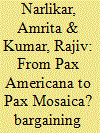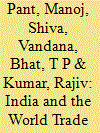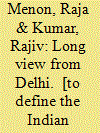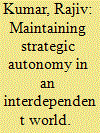|
|
|
Sort Order |
|
|
|
Items / Page
|
|
|
|
|
|
|
| Srl | Item |
| 1 |
ID:
157022


|
|
|
| 2 |
ID:
112088


|
|
|
|
|
| Publication |
2012.
|
| Summary/Abstract |
While the economic rise of new powers, frequently identified as the 'BRICs' (Brazil, Russia, India, and China), has been dramatic, the implications of this emerging multipolarity for global economic governance are not clear. In this paper, we address the question: can the diffusion of power among a greater diversity of countries result in the creation of a new global economic order-a Pax Mosaica-to succeed the Pax Americana of the previous century? Our argument proceeds in four steps. First, we provide a brief overview of the achievements and limitations of the system that was established at the end of World War II, and lasted for over half a century in the form of Pax Americana. In the second section, we investigate the emergence of multipolarity, and highlight the opportunities and costs that this generates. In the third section, we explore the routes whereby the changing balance of power might be harnessed towards the creation of a Pax Mosaica. We do so by posing four sets of questions, which must be answered if the mosaic distribution of power is to lead to greater economic stability, growth, and peace. The fourth section concludes the paper with ideas for reform with reference to the World Trade Organization, the Bretton Woods institutions, and the G20.
|
|
|
|
|
|
|
|
|
|
|
|
|
|
|
|
| 3 |
ID:
106972


|
|
|
|
|
| Publication |
New Delhi, BS Books, 2010.
|
| Description |
186p.
|
| Standard Number |
9789380740010, hbk
|
|
|
|
|
|
|
|
|
|
|
|
Copies: C:2/I:0,R:0,Q:0
Circulation
| Accession# | Call# | Current Location | Status | Policy | Location |
| 056174 | 327.54/KUM 056174 | Main | On Shelf | General | |
| 056444 | 327.54/KUM 056444 | Main | On Shelf | General | |
|
|
|
|
| 4 |
ID:
112556


|
|
|
|
|
| Publication |
New Delhi, Books, 2010.
|
| Description |
186p.Hbk
|
| Standard Number |
9789380740010
|
|
|
|
|
|
|
|
|
|
|
|
Copies: C:1/I:0,R:0,Q:0
Circulation
| Accession# | Call# | Current Location | Status | Policy | Location |
| 056445 | 327.54/KUM 056445 | Main | On Shelf | General | |
|
|
|
|
| 5 |
ID:
074186


|
|
|
| 6 |
ID:
106228


|
|
|
|
|
| Publication |
New Delhi, Academic Foundation, 2010.
|
| Description |
182p.Paperback
|
| Standard Number |
9788171888009
|
|
|
|
|
|
|
|
|
|
|
|
Copies: C:4/I:0,R:0,Q:0
Circulation
| Accession# | Call# | Current Location | Status | Policy | Location |
| 055164 | 327.54/MEN 055164 | Main | On Shelf | General | |
| 055368 | 327.54/MEN 055368 | Main | On Shelf | General | |
| 056446 | 327.54/MEN 056446 | Main | On Shelf | General | |
| 056447 | 327.54/MEN 056447 | Main | On Shelf | General | |
|
|
|
|
| 7 |
ID:
097311


|
|
|
| 8 |
ID:
143936


|
|
|
|
|
| Summary/Abstract |
The paper examines if the business sector in India has had a tangible influence on India’s foreign policy. It suggests several factors for which private business failed to have any influence on India’s foreign policy during the first three decades after Independence. It suggests a conceptual typology of the principal drivers of India’s foreign policy, which, according to the author, provides an effective framework for understanding the role of the private sector since it began to wield some influence in the mid-1980s. The paper uses this threefold classification to argue that, in the period from the 1980s to today, contrary to the general perception, the role of the Indian business sector (and especially of industry associations) on India’s foreign policy has been marginal and restricted to some specific sectors.
|
|
|
|
|
|
|
|
|
|
|
|
|
|
|
|
|
|
|
|
|